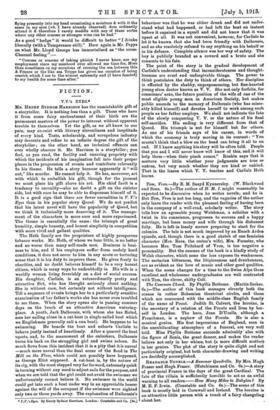FICTION.
V.V.'s EYES.*
MR. HENRY SYDNOR HARRISON has the unmistakable gift of a storyteller. It is nothing less than a gift. Those who have it from some fairy enchantment of their birth are the permanent masters of the power to interest without apparent trouble to themselves. Yet the gift, as we all know to our pain, may co-exist with literary slovenliness and ineptitude of every kind. Taste, scholarship, and scrupulous industry may decorate and refine to an infinite degree the gift of the storyteller ; on the other hand, no technical offences can ever wholly obscure it. Mr. Harrison is a storyteller ; you feel, as you read, the facility and unerring propriety with which the incidents of his imagination fall into their proper places in the progression of events and contribute relevantly to his theme. He tells a story because apparently it "will out," like murder. He cannot help it. He has, moreover, art with which to embellish his gift, though for the present we must place his gift above his art. His chief fault is a tendency to unreality—also no doubt a gift on the sinister side, but with care he may be able to dispossess himself of it. It is a good sign that there are fewer unrealities in Y. V.'s Eyes than in his popular story Queed. We do not predict that his latest novel will have the popularity of Queed, but we think it technically more deserving of it. The manage- ment of the characters is more sure and more experienced. The theme is essentially the same : the triumph of great humility, simple honesty, and honest simplicity in competition with more vivid and gallant qualities.
The Heth family are the proprietors of highly prosperous tobacco works. Mr. Heth, of whom we hear little, is no better and no worse than many self-made men. Business is busi- ness to him, and if his employees suffer from unduly hard conditions, it does not occur to him in any acute or torturing sense that it is his duty to improve them. He gives freely to charities, and no doubt believes himself to be a very honest citizen, which in many ways he undoubtedly is. His wife is a worldly woman living feverishly on a diet of social success. His daughter, Carlisle, is an extraordinarily pretty and attractive flirt, who has thought seriously about nothing. She is without care, but certainly not without intelligence. Till a sequence of events brings her to a particularly sensitive examination of her father's works she has never even troubled to see them. When the story opens she is passing summer days on the beach of an attractive American watering- place. A youth, Jack Dalhousie, with whom she has flirted, sees her sailing alone in a cat-boat (a single-sailed boat which we Englishmen generally call a una boat). He happens to be swimming. He boards the boat and exhorts Carlisle to behave justly instead of heartlessly. After a quarrel the boat upsets, and, to the amazement of the onlookers, Dalhousie turns his back on the struggling girl and swims ashore. So much flows from this incident that it is a pity that it is unreal —much more unreal than the final scene of the flood in The Mill on the Floss, which could not possibly have happened, as George Eliot supposed. A cat-boat is, by the nature of its rig, with the mast stepped very far forward, extremely quick in turning without any need to adjust sails for the purpose, and when we are told that the girl could not avoid the swimmer we unfortunately cannot believe it. No swimmer in the world could get into such a boat under way in an appreciable breeze against the will of the occupant if the swimmer were sighted only two or three yards away. The explanation of DalhouSie's • V. Y.'s Byes. By Henry Sydnor Harrison. London: Constablo and Co. [6s.] behaviour was that he was either drunk and did not under- stand what had happened, or had left the boat an instant before it capsized in a squall and did not know that it was upset at all. It was not convenient, however, for Carlisle to let it be known that she had been friendly with Dalhousie, and so she resolutely refused to say anything on his behalf or in his defence. Complete silence was her way of safety. The boy is publicly branded as a coward and a brute and she consents to his fate.
The point of the story is the gradual development of Carlisle's understanding that inconsiderateness and thought- lessness are cruel and unforgivable things. The power to think postulates the duty to think of others. Her discipline is effected by the shabby, unprepossessing, but fine-hearted young slum doctor known as V. V. She not only forfeits, for conscience' sake, the future position of the wife of one of the most eligible young men in American Society, but makes public amends to the memory of Dalhousie (who has miser- ably killed himself) and devotes herself to work among such people as her father employs. We shall not indicate the fate of the slowly conquering T. V. or the nature of his final self-sacrifice. His ending is very different from that of Queed. His triumph is not for himself but for others. As one of his friends says of his career, in words of which the economy is truly moving in its context : " You mustn't think that a blow on the head can bring it all to an end. If I know anything his story will be often told. People that you and I will never know will know of this, and it will help them—when their pinch comes." Ruskin says that it matters very little whether your judgments are true or untrue, but very much whether they are kind or unkind. That is the lesson which V. V. teaches and Carlisle Halt learns.


















































 Previous page
Previous page